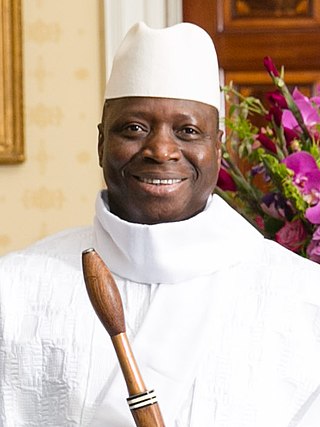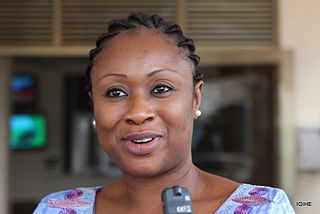Contents
| |||||
| Decades: | |||||
|---|---|---|---|---|---|
| See also: | |||||
Events in the year 2024 in the country of Gambia.
| |||||
| Decades: | |||||
|---|---|---|---|---|---|
| See also: | |||||
Events in the year 2024 in the country of Gambia.
Source: [6]

The Gambia, officially the Republic of The Gambia, is a country in West Africa. Geographically, The Gambia is the smallest country in continental Africa; it is surrounded by Senegal on all sides except for the western part, which is bordered by the Atlantic Ocean.

Politics of The Gambia takes place within the framework of a presidential republic, whereby the President of The Gambia is both head of state and head of government, and of a multi-party system. Executive power is exercised by the government. Legislative power is vested in both the government and parliaments.

Yahya Abdul-Aziz Jemus Junkung Jammeh is a Gambian politician and military dictator who overthrew the elected government and became President of the Gambia from 1996 to 2017, as well as Chairman of the Armed Forces Provisional Ruling Council (AFPRC) from 1994 to 1996.

Islam is the major religion in the Gambia, representing 97% of the 2 million population, with the first Muslim communities in the country arriving in 11th century. Islam has therefore had an influence on the Gambia throughout history, and continues to impact its culture, society and politics. The majority of The Gambia's Muslims are Sunni belonging to the Maliki school of jurisprudence, influenced with Sufism. There is a smaller Shiite community, largely stemming from Lebanese and Arab migration. The Ahmadiyya movement is also present. Other religious societies exist in the country, including Catholics, Protestants, Hindus and Traditional African religions.

Lesbian, gay, bisexual, transgender, and queer (LGBTQ) people in the Gambia face significant challenges not experienced by non-LGBTQ residents. Same-sex sexual activity is illegal for both men and women in the Gambia. Criminalisation commenced under the colonial rule of the British. The 1933 Criminal Code provides penalties of prison terms of up to fourteen years. In 2014, the country amended its code to impose even harsher penalties of life imprisonment for "aggravated" cases. The gender expression of transgender individuals is also legally restricted in the country. While the United States Department of State reports that the laws against homosexual activity are not "actively enforced", arrests have occurred; the NGO Human Rights Watch, reports regular organised actions by law enforcement against persons suspected of homosexuality and gender non-conformity.

Hassan Bubacar Jallow is a Gambian judge who has served as Chief Justice of the Gambia since February 2017. He was the Prosecutor of the International Criminal Tribunal for Rwanda (ICTR) from 2003 to 2016, and the Prosecutor of the International Residual Mechanism for Criminal Tribunals (IRMCT) from 2012 to 2016, both at the rank of United Nations Under Secretary-General. He served as Minister of Justice and Attorney General from 1984 to 1994 under President Dawda Jawara.

The Gambia is a Muslim majority country, with Muslims constituting 96.4% of the population, some 3.5% are Christian, and 0.1% practice other religions.

Fatou Bom Bensouda is a Gambian lawyer and former Prosecutor of the International Criminal Court (ICC), who has served as the Gambian High Commissioner to the United Kingdom since 3 August 2022.

Female genital mutilation (FGM), also known as female genital cutting (FGC), female genital mutilation/cutting (FGM/C) and female circumcision, is practiced in 30 countries in western, eastern, and north-eastern Africa, in parts of the Middle East and Asia, and within some immigrant communities in Europe, North America and Australia, as well as in specific minority enclaves in areas such as South Asia and Russia. The WHO defines the practice as "all procedures that involve partial or total removal of the external female genitalia, or other injury to the female genital organs for non-medical reasons."
Amadou Scattred Janneh is a Gambian politician with Gambian and American dual citizenship. A former Minister of Information and Communication for the national government, he was sentenced to life in prison for treason after distributing T-shirts with the slogan "End to Dictatorship Now". After international protest from organizations including Amnesty International and an appeal by US activist Jesse Jackson, Janneh was pardoned and returned to the US.

The Gambia–North Korea relations refers to the current and historical relationship between The Gambia and the Democratic People's Republic of Korea (DPRK), known as North Korea in the Western World. Hong Son-phy is the accredited ambassador to Banjul.

Mama Fatima Singhateh is a Gambian lawyer, judge, and politician. Between 2009 and 2013, she was a judge in the High Court, then at the Court of Appeal of The Gambia. She subsequently served as Minister of Justice and Attorney General of the Gambia from 2013 to 2014, and again from 2015 to 2017. She currently serves as the United Nations Special Rapporteur on the Sale and Sexual Exploitation of Children.

Adama Barrow is a Gambian politician and real estate developer who has served as President of the Gambia since 2017.
Gambia Coalition 2016 was the governing coalition of The Gambia in the late 2010s, consisting of seven Gambian political parties, civil society groups and one independent candidate created to field and support a unity ticket for the opposition in the 2016 presidential election. The coalition selected real estate developer and deputy treasurer of the United Democratic Party (UDP) Adama Barrow as their candidate. Barrow officially left the UDP to allow him to run as an independent candidate, although his candidacy continued to be supported by the UDP through its membership in the coalition.

A constitutional crisis occurred in Gambia following presidential elections in December 2016, in which challenger Adama Barrow achieved an upset victory over longtime incumbent Yahya Jammeh. It eventually concluded after a military intervention by the Economic Community of West African States (ECOWAS) led to Jammeh’s departure from the country.
The following lists events in the year 2017 in the Gambia.
Human rights in the Gambia have been considered poor under Yahya Jammeh. In December, 2016, he lost an election to Adama Barrow, who promised to improve human rights in his country. The "Freedom in the World" report for 2018 ranked the Gambia as "partly free". LGBT activity is illegal, and punishable with life imprisonment.
Baba Galleh Jallow is a Gambian academic and journalist who was appointed as executive secretary of the Truth, Reconciliation and Reparations Commission (TRRC) in February 2018.
Fatou A. "Toufah" Jallow is a Gambian beauty queen. She became known in 2014 for her accusations of rape and sexual harassment against Gambian President Yahya Jammeh.
Capital punishment remains a legal penalty for multiple crimes in The Gambia. However, the country has taken recent steps towards abolishing the death penalty.